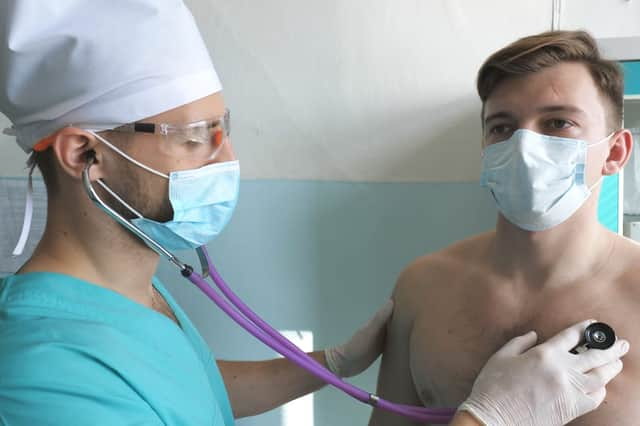A new protein-based coronavirus treatment could reduce severe symptoms by nearly 80% - what it means for patients


A new protein-based coronavirus treatment could dramatically reduce the number of patients who suffer severe symptoms and require intensive care, according to preliminary trial results.
The treatment, developed by Southampton-based biotech Syniargen, has been hailed as a “major breakthrough” in the fight to find an effective drug treatment against the virus.
How does it work?
Advertisement
Hide AdAdvertisement
Hide AdThe drug treatment uses a protein called interferon beta, which is produced by the body when it contracts a viral infection.
The protein is inhaled directly into the lungs of coronavirus patients using a nebuliser, with the aim of stimulating an immune response.
Initial findings from the trial, published on Monday (20 July), suggest that the treatment cuts the chances of a coronavirus patient developing severe symptoms of the disease, such as requiring a ventilator, by 79 per cent.
Patients in the trial were at least twice as likely to recover from the virus to the point where everyday activities were not compromised by their illness, according to Synairgen.
Advertisement
Hide AdAdvertisement
Hide AdThe trial also indicated that the treatment “significantly reduced breathlessness”, which is one of the main symptoms in patients with severe coronavirus.
Additionally, the drug was found to reduce the average time patients spent in hospital by a third, falling from an average of nine days to just six, and no deaths occurred among patients who received the treatment.
Will the treatment be used more widely?
The double-blind trial involved 101 volunteers who had been admitted for treatment at nine UK hospitals for Covid-19 infections, between 30 March and 27 May.
Half of the patients in the trial were given the protein-based drug, while the other half were given a placebo.
Advertisement
Hide AdAdvertisement
Hide AdPatient groups were evenly matched in terms of age, with those given the placebo aged 56.5 on average, while those receiving the protein treatment averaged 57.8 years.
Stock market rules mean Synairgen is obliged to report the preliminary results of the trial, but they have not yet been published in a peer-reviewed journal, nor has the full data been released.
However, if the results of the trial are later confirmed in larger studies, the new treatment could mark an important step forward in the fight against the virus.
While the sample size was relatively small, the results showing the effectiveness of the treatment were unusually strong, according to lead scientist in charge of the trial, Professor Tom Wilkinson.
Advertisement
Hide AdAdvertisement
Hide AdIf further studies yield the same results, Prof Wilkinson said the drug will be a “game changer” for coronavirus treatment, and described the findings as a “major breakthrough in the treatment of hospitalised Covid-19 patients”.
He said: “We are delighted with the positive data produced from this trial, which is the result of a momentous coordinated effort.
“The results confirm our belief that interferon beta, a widely known drug that, by injection, has been approved for use in a number of other indications, has huge potential as an inhaled drug to be able to restore the lung’s immune response, enhancing protection, accelerating recovery and countering the impact of SARS-CoV-2 virus.”
What happens next?
Synairgen chief executive Richard Marsden told the BBC that the company will be presenting its findings to international medical regulators over the coming days.
Advertisement
Hide AdAdvertisement
Hide AdFollowing this, they will then seek approval for the treatment. Unless they are granted emergency approval, as was the case with anti-viral drug Remdesivir, this process could take months.
If it does receive approval, both the treatment and nebulisers used to administer it will need to be manufactured in large quantities.
Mr Marsden said he had instructed companies to start producing supplies back in April to ensure they were ready for a mass roll-out, and said he expects the company to be able to deliver "a few 100,000" doses per month by the winter.